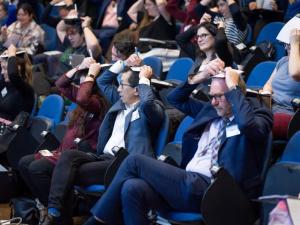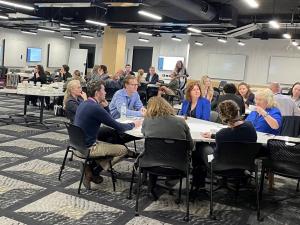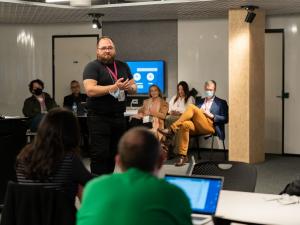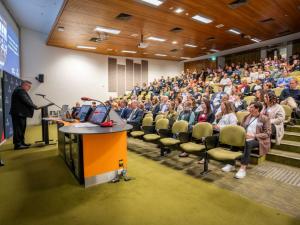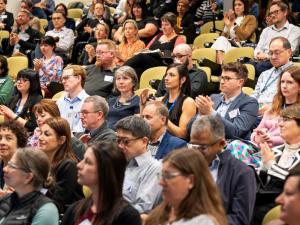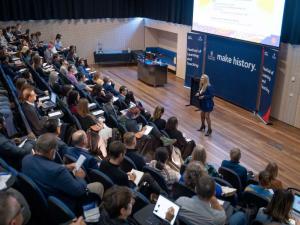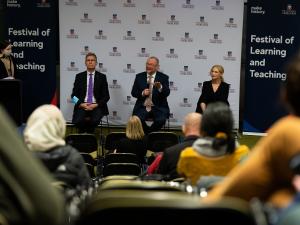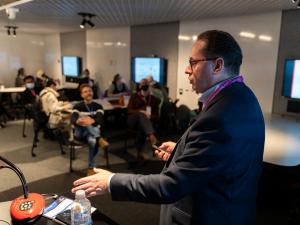Festival of Learning and Teaching
The Festival of Learning and Teaching provides a space for academic and professional staff and student leaders to come together to focus on the education endeavor integral to the purpose of the University. It is an opportunity for all staff who teach or support learning to share practice, be inspired, learn from one another, and network.
This year participants engaged in discussions around the Festival's theme 'Transformation in Learning and Teaching' on Tuesday 24 June 2025.
The half day event began with a keynote presentation in the Braggs Lecture Theatre followed by concurrent sessions held on Level 5 of Union House.
View Program in full here.
Attendees heard from keynote speaker Professor Chi Baik and University colleagues across a range of informative sessions.
View slides from the keynote presentation

Features of June Program
KEYNOTE
Transformation with purpose: Teaching and learning for work, self and a changing world
What does it mean to create transformative learning experiences in higher education—ones that help prepare students not just for work, but to adapt and engage actively with a rapidly changing world? This presentation explores how universities might design teaching and learning to support students’ intellectual growth, wellbeing and capacity to manage complexity in an uncertain future.
As students enter higher education from increasingly diverse backgrounds and with shifting expectations, their reasons for learning—and what they need from us—are evolving. Beyond gaining knowledge and skills, university can also be a space for personal growth, connection, and self-discovery.
Drawing on recent research and emerging practices, the presentation considers what purposeful transformation of teaching and learning might look like today—across curriculum, pedagogy and the broader university environment. It explores how universities can better support student engagement, wellbeing, and success—both during their studies and in their lives after university.
Interactive concurrent sessions on the following topics
- Interactive presentations
- Marketplace of Ideas
- AI in Learning, Teaching and Assessment
- Designing assessment with AI in mind
Footage taken from the Festival of Learning and Teaching October 2023
Resources from previous Festival of Learning and Teaching events
-
2024 Festival of Learning and Teaching - October event
The final festival for 2024 was held on Thursday 31 October on campus. The theme of the festival was 'Impact through inclusion and innovation'.
-
2024 Festival of Learning and Teaching - June event
The first of two events for the 2024 festival was held on Friday 14 June on campus. The theme of the festival was 'Meaningful approaches to learning and teaching in the age of AI'.
-
2023 Festival of Learning and Teaching - October event
The final of three events for the 2023 festival was held on Tuesday 31 October on campus. The theme of the festival was 'Future-focused Curriculum: Fit for a new University'.
-
2023 Festival of Learning and Teaching - June event
The second of three events for the 2023 festival was held on Friday 16 June on campus. The focus of the festival was 'Activating Learning'.
-
2023 Festival of Learning and Teaching - April event
The first of three events for the 2023 festival was held on Thursday 13 April on campus. The focus of the festival was 'A Vision for Transforming Learning'.
To help craft a strong and positive future for our students, in 2023 the University embarked on a journey to design a future-fit learning and teaching strategy: Education in a Digital World.
The Festival celebrates innovation in learning and teaching at the University of Adelaide. 2023 events were remodelled to align with the development of the strategy and to be responsive to the needs of academic and professional staff who teach and support learning.
-
2022 Festival of Learning and Teaching
The 2022 festival was held on Thursday 14 July on campus. The focus of the Festival was 'Relationships Rich Education'.
-
2021 Festival of Learning and Teaching
The 2021 festival was held over two half days Tuesday 28 September (on campus) and Wednesday 29 September (online). The focus of the Festival was 'Blended Futures', providing an opportunity for us to celebrate and share new approaches to blended learning at Adelaide, and to explore future directions.
-
2020 Festival of Learning and Teaching
For the first time the Festival of Learning and Teaching was held fully online. The Festival theme, ‘Looking Back, Looking Forward’, offered a great mix of provocative keynotes from leading sector voices and stimulating presentations, workshops and panels delivered by University staff and students.

